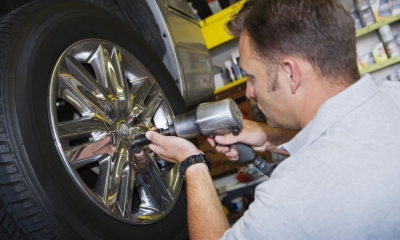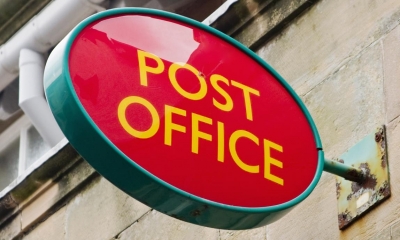
There is a wide range of legislation that can apply to tyre fitting businesses, some of which is likely to be particularly relevant. The following is an overview of some of the key areas that you should be aware of. The list is not intended to be exhaustive.
What licences does a tyre fitter need?
There are currently no licensing requirements relating specifically to tyre fitters. Note however that some local authorities - particularly those in Scotland - require sellers of part-worn tyres to obtain a second hand dealer's licence. Contact your local authority trading standards department to find out more if you think this could apply to your business.
Some tyre fitters use large goods vehicles to provide a mobile commercial vehicle tyre repair or fitting service. If you decide to use a large goods vehicle (that is, any vehicle with a gross plated weight of more than 3.5 tonnes - or an unladen weight of more than 1,525 kg for unplated vehicles) then you will need a goods vehicle operator's licence in England, Scotland and Wales. A restricted category licence is sufficient for businesses which only carry their own goods and equipment. In Northern Ireland you may need a goods vehicle operator's licence from the the Transport Regulation Unit (TRU) of the Department for Infrastructure (DfI). Your driver/s must be appropriately licensed too. More information about goods vehicle operator licensing is available on the Gov.uk website - and from the DfI in Northern Ireland.
If your business sells tyre insurance policies (or other insurance policies - for example MOT insurance) then this is classed as general insurance and is regulated by the Financial Conduct Authority (FCA). Your business must either be authorised by the FCA or an 'appointed representative' of an authorised firm. The FCA website has more information.
Under pollution control legislation you may need a permit from your environmental regulator or your local authority if you engage in the following activities:
- operating a waste oil burner (for heating purposes) - sometimes referred to as a 'small waste oil burner permit'
- spray painting vehicles (refinishing)
Your local authority will only issue a permit if your equipment and installations meet the necessary requirements. Contact your local authority environmental health department for more information and an application form.
Note that you must only use a registered tyre collector for disposing of used tyres.
Tranporting waste yourself
If you are planning to transport your own business waste in your vehicles - for example old tyres removed from vehicles by your mobile fitting teams - then you will need a certificate of registration as a lower tier waste carrier (or equivalent in Scotland). This is issued by the Environment Agency in England, Natural Resources Wales, the Northern Ireland Environment Agency, and the Scottish Environment Protection Agency (SEPA). There is no charge for registering.
Hazardous waste producers
Note that any business which produces 500kg or more of hazardous waste at a premises in Wales within a 12 month period must register with Natural Resources Wales as a hazardous waste producer. Hazardous waste includes old lead acid batteries removed from vehicles. You can find out more about hazardous waste producer registration on the Gov.uk website.
Roadside tyre fitters - REACT voluntary licensing
In response to safety concerns regarding roadside truck tyre fitters, the National Tyre Dealers Association (NTDA) has set up the Roadside Emergency Action Concerning Tyres (REACT) Licence to Fit scheme. Individual fitters who carry out this type of work can undergo specialist safety training and become licensed REACT fitters. You can find out more about the REACT scheme on the NTDA website.
Tyre safety standards
Specific regulations set standards for the construction and marking of all tyres sold for road use in the UK. You must only supply tyres that comply with these standards. Retreaded tyres and part-worn tyres must also comply with the appropriate British and European Standards and legislation. In the case of part worn tyres, these cover such things as the amount of tread left, and checking the tyre for any significant defects. Don't forget that part worn tyres must be permanently marked as such before being sold, a point which is often overlooked. British Standards also cover tyre repairs, so if you mend any punctures make sure that the repair is done properly. You should also be familiar with the minimum tread depth requirements so that you are able to advise customers when their tyres are approaching the legal limits.
Your local authority trading standards department will be able to help you with any questions you might have about tyre specification and marking requirements. Reputable tyre suppliers should be able to help with this too.
Tyre labelling
Tyre manufacturers must provide a 'consumer advice' label with the tyres they distribute. This must provide information about fuel efficiency, wet grip and rolling noise. Tyre retailers must pass this information on to the end user. There is more information about tyre labelling requirements on the National Tyre Distributors Association (NTDA) website.
Hazardous substances
Various hazardous substances are used in garages and specific regulations cover their use, storage and disposal. Ensure that your and any employees' exposure to potentially harmful substances is minimised. This might involve precautions such as using dust masks and goggles when changing brake components, and using gloves or barrier cream to limit exposure of the skin to substances like oil or brake fluid. Hazardous substances must be stored correctly, too.
Disposal of old tyres
All waste tyres must be disposed of properly. They may only be taken away and disposed of by a registered waste carrier authorised by the Environment Agency in England, Natural Resources Wales, the Northern Ireland Environment Agency, and the Scottish Environment Protection Agency (SEPA) in Scotland. If you are unsure whether a collection firm is authorised, you should check with the Environment Agency, the Northern Ireland Environment Agency or SEPA. Similar rules apply to the disposal of hazardous wastes, such as old engine oil or brake fluid. Visit the Gov.uk website for further guidance.
Goods and services - consumer protection
There is a range of legislation that applies to all businesses to protect the interests of the customer. For example, goods and services must not be misleadingly described. You will be responsible for making sure that all parts supplied are fit for their intended purpose, and that both parts and work done are of satisfactory quality - all repairs must be done with care. More information and guidance on consumer protection and fair trading legislation are available on the Trading Standards Business Companion website. Information is also available on the Gov.uk website.
Parts and repair standards
Legislation covers the sale and supply of goods and services - including the supply of car parts and repairs. You are responsible for ensuring that the correct parts are used and fitted safely and that all work is carried out in a way that will ensure the safety of any future driver of the car.
Health & safety, fire
You must also make sure that you comply with workplace health and safety and fire safety legislation.
Employment legislation
Anyone employing staff must comply with employment legislation. Important areas of legislation include:
Recruitment and employment contracts
Working time: hours, leave, flexible working
Maternity, paternity and adoption
Managing home workers, remote workers, lone workers
Insurance for a tyre fitter
When you start up in business you will need insurance cover. Contact an insurer and explain how your business will operate. They will then recommend what cover you should have, which might include:
- employer's liability
- public liability
- product liability
- motor trader's insurance, to cover you and your staff when you're driving customer's vehicles - and to cover customers' vehicles when they're on your premises
- premises, premises contents and stock
- cash
- business interruption
- motor insurance (for parts collecting vehicles, mobile tyre fitting van)
The National Tyre Distributors Association (NTDA) has negotiated special rates on business insurance for its members.



